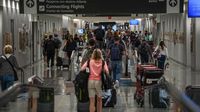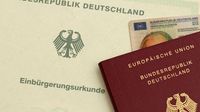As U.S. immigration policies grow stricter, allies such as Germany and the United Kingdom are re-evaluating their travel advisories. The recent surge in detentions and non-entry incidents involving foreign nationals has triggered heightened scrutiny on how citizens from those countries fare at U.S. borders. Following several detentions, Germany issued an updated travel advisory emphasizing that possessing a visa or entry waiver does not guarantee automatic access into the U.S. On March 20, 2025, a spokesperson from Germany's Foreign Ministry stated, "The final decision on whether a person can enter the U.S. lies with the U.S. border authorities," echoing a sentiment of caution for those preparing to visit the United States.
The update shines a spotlight on the stark reality that travelers, especially those from allied nations, must navigate a landscape marked by uncertainty and the possibility of detention. This re-evaluation aligns with the tightening enforcement of immigration laws under the Trump administration, which has sparked unrest and skepticism over the treatment of foreigners arriving in the country.
Recent incidents have drawn attention not just in Germany but also in the U.K. In their warning, British travel advice now emphasizes the strict enforcement of immigration regulations, cautioning travelers that any breaches could lead to potential arrest. The updated advisory warns that Britons “must comply with all entry, visa and other conditions of entry,” adding that any failure to adhere to these regulations could lead to dire consequences.
A significant factor in the U.K.'s change of heart came on the heels of incidents like that of Rebecca Burke, a 28-year-old British national who faced serious immigration troubles in the U.S. After being denied entry while trying to travel to Canada, she was held in a detention center for three weeks. She was reportedly handcuffed and later transferred to the Tacoma Northwest detention facility in Washington state. Her experience has raised concerns over the new realities faced by British travelers. The Foreign, Commonwealth and Development Office promptly supported Rebecca during her ordeal, providing contact with local authorities.
Germany's advisory follows similar sentiments, with the German government monitoring the experiences of its citizens, especially after reports of Danish and French nationals being detained in the U.S. as well. The German government noted that several of its citizens, including those with valid entry permissions, faced unexpected challenges when attempting to enter the United States.
This wave of revised travel advisories comes after France's higher education minister weighed in on the situation after a French scientist was blocked from entering the U.S. while en route to a conference in Houston. The scientist was deported after U.S. officials discovered text messages perceived as critical of President Trump's policies, leading to alarm across the Atlantic. Philippe Baptiste stated, “Freedom of opinion, free research, and academic freedom are values we will continue to proudly uphold. I will defend the right for all French researchers to be faithful to them, while respecting the law.”
These instances prompt questions about the ongoing implications of U.S. immigration policies under President Trump. With stricter measures being implemented, countries like Germany and the U.K. are asking their citizens to exercise heightened vigilance when traveling. This could potentially lead to decreased tourism and increased diplomatic tensions as allies express concerns regarding the treatment of their citizens.
It remains uncertain how these developments will alter U.S. tourism dynamics, already weakened by tariffs and ongoing public health issues. The Department of Homeland Security is yet to provide commentary on the shift in travel advisories and its possible implications for international visitors. As public discourse surrounding immigration continues to evolve, it is evident that travelers must now navigate a more precarious landscape.
In light of these developments, travelers from allied nations must pay close attention to updated travel advisories and understand the responsibilities tied to their immigration status. Their experiences offer a pivotal moment in assessing U.S. border policies in an era marked by uncertainty and controversy.






